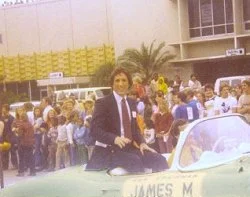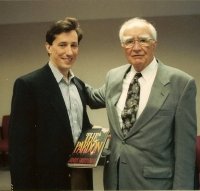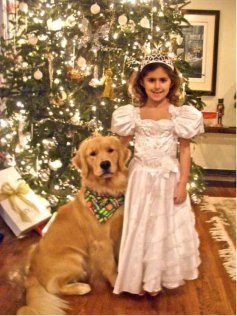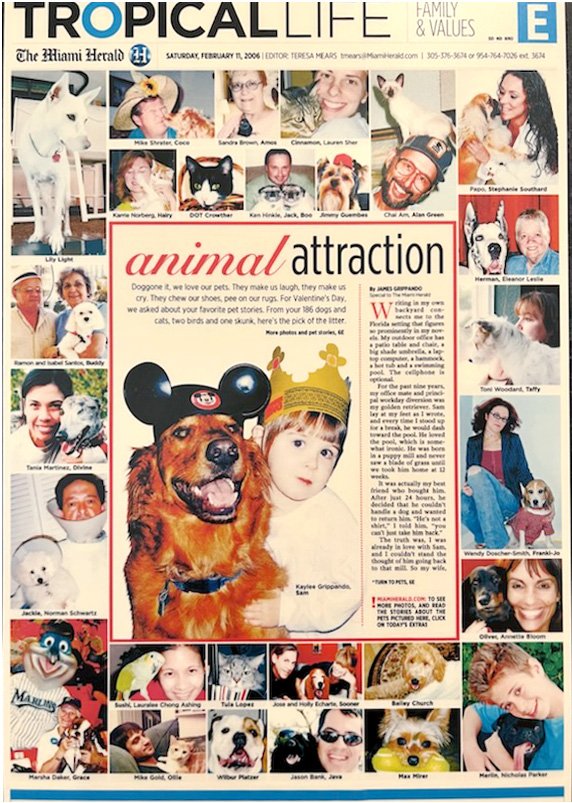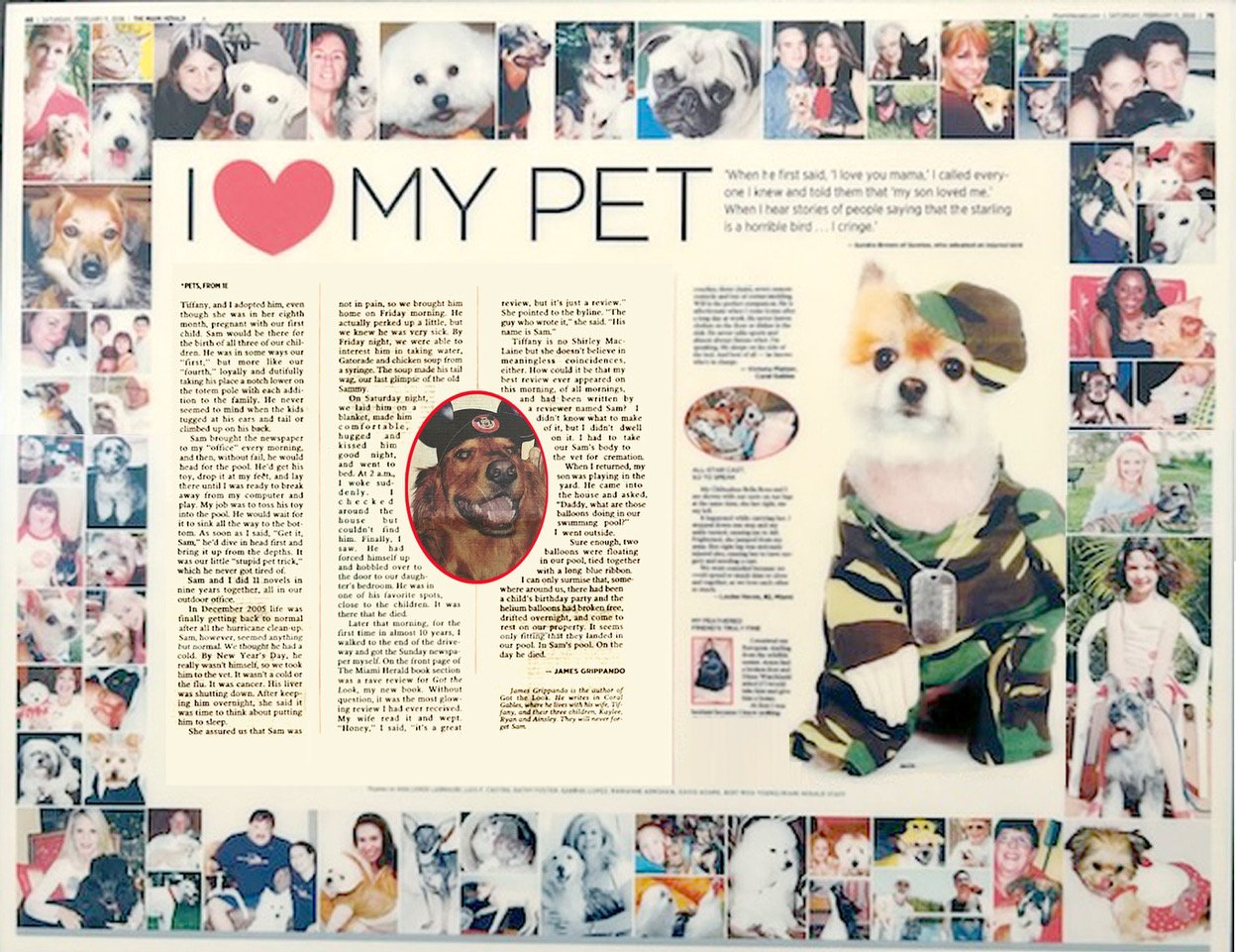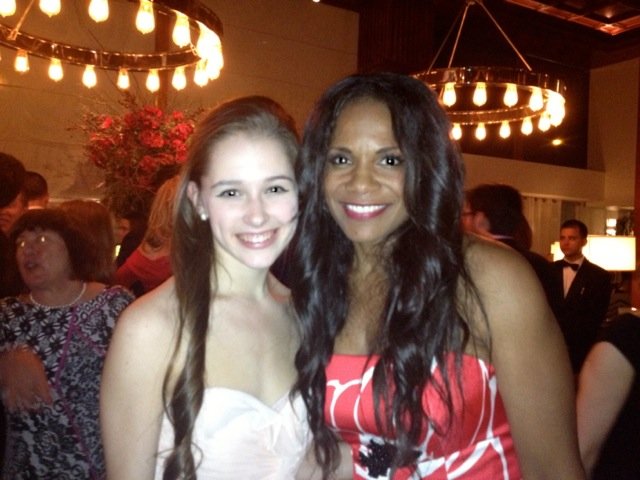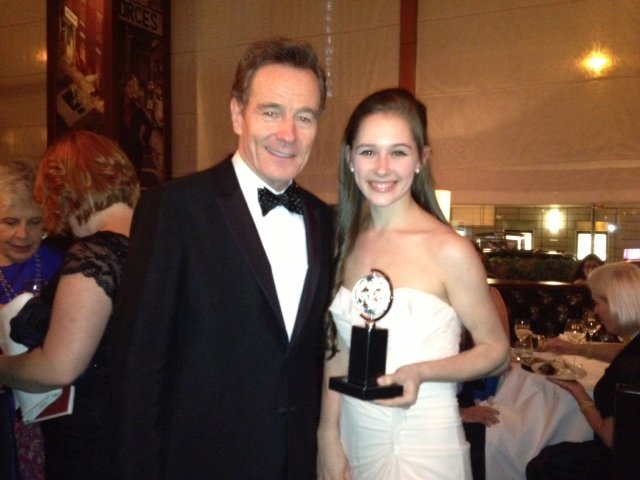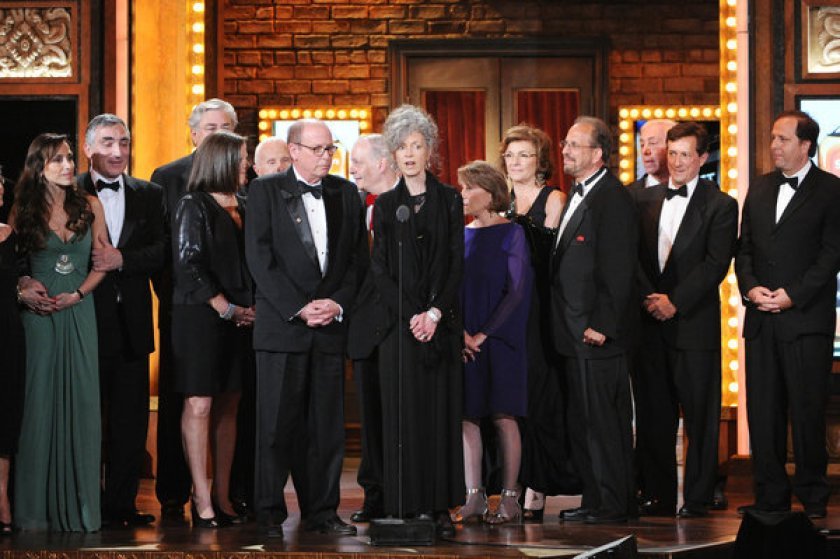"ENOUGH ABOUT YOU ..."
I was a trial lawyer for twelve years before I became a full-time writer, so the people who know and love me best seem to divide my life into two distinct periods. My life as a writer, which is now in its third decade, and my past life as a full-time lawyer, which is "When Jimmy had a job." They have a point, of course. I love writing, and it's hard to think of it as a job. To understand how I got here, there's only one place to start: where I came from.
Growing Up
Me as a young boy in my endless backyard.
I lived the first eighteen years of my life in a rural subdivision of Antioch, Illinois, just south of the Wisconsin border. I do mean rural. My mom, dad, three sisters, younger brother and I shared a modest house on a gravel road. (The street name was Pineview Drive, and my agent's surname is Pine -- coincidence?) Across the street was a cornfield. Depending on how many weeds my brother and I decided to mow, we had a football field on one side of the house and a baseball diamond on the other. Down the road was Loon Lake (my friends and I were known as "the Looney Lakers"). We swam there in summer and ice skated there in winters. Bicycles were the preferred mode of transportation. Our Labrador retriever followed us everywhere, never a day in his life on a leash. It was a great place to grow up. Naturally, by the time I was eighteen, I couldn't wait to leave.
Homecoming 1980 - Jack Swyteck would have loved the classic Corvette.
My freshman year of college was at the University of Illinois. Then my family moved to Florida, and I transferred to the University of Florida in Gainesville. I'm a proud "Double Gator," having earned my B.A. with high honors and my law degree with honors. I graduated second in my undergraduate class, was selected to Phi Beta Kappa, and was chosen as the outstanding graduate for leadership. In law school I served as Executive Editor of the University of Florida Law Review and was selected to Order of the Coif. All of this creates a rather grand illusion that I was quite a serious student, but I had a lot of fun, too. A highpoint was when I served as general chairman of the homecoming festivities, which is a big deal at UF. Gator Growl, a spectacular pep rally in Florida Field the night before the game, has always featured a big name entertainer, such as Bob Hope, Robin Williams, or Bill Cosby. My year, it was George Burns. (Years later, I discovered that my agent got his start in the entertainment industry doing publicity work for George Burns -- coincidence?)
Influences
People often want to know who or what steered me toward writing. First, I'd say my mom. Some of my earliest childhood memories are of my father coming home from work on Saturday afternoon from the printing company, and my mother feeding me and giving me a bath before she headed off in her starched white nursing uniform to work the Saturday night late shift at the hospital. Somehow she managed to raise five kids, work, and take courses on the side to get a doctorate degree in education. Her dissertation was later published and became one of the top textbooks in the country for nursing students. More than a quarter century later it was still going strong in its sixth edition. I hope I can have a run like that.
I also had a great high school English teacher, James Corrigain. With his gray hair and thick salt-and-pepper beard, he reminded me of Ernest Hemingway. Probably the most important thing he taught me was that, to be a good writer, you have to be a voracious reader. It was Mr. Corrigan who gave me one of the most unforgettable books I've ever read, the Pulitzer Prize winning play, A Man for All Seasons. It's the story of Sir Thomas Moore, who was tried for treason and beheaded after he refused on principle to sign an oath approving the marriage of King Henry VIII to Ann Boleyn. I still have that book. It became especially meaningful to me in the early years of my legal career, when I was young and naïve and appalled to discover how many witnesses lied under oath. People complain that lawyers are always trying to trip them up with their clever questions, but in my experience witnesses too often had to be tricked into telling the truth. In my most cynical moments as a trial lawyer, I'd go back to Sir Thomas Moore and the sanctity of an oath. It's just one of the many ways I'm so often reminded of my high school English teacher.
From my college years, I'm indebted to Sid Homan, head of the English Department at the University of Florida. For two years I was one of six students in a university of over 30,000 students who was lucky enough to participate in Sid's honors program for the College of Liberal Arts and Sciences. We wrote at least two papers each week, and Sid would select one to read to the class. It was the first time I'd ever heard anyone read my work aloud. It's amazing how embarrassing a bad sentence can be when you actually have to hear someone else trip over it. To this day, I never publish a sentence I've written without reading it first -- aloud.
Me with Judge Clark after the publication of my first novel, The Pardon
I learned a lot about writing from lawyers, too. Lawyers are natural story tellers, and I mean that in a good way. A man I'll remember most fondly is The Honorable Judge Thomas A. Clark, who served on the United States Court of Appeals for the Eleventh Circuit in Atlanta. He gave me my first job out of law school, a coveted federal clerkship. Now that I write legal thrillers, it's tempting to give in to the insatiable public appetitive for cynical characters who bash the legal system. I try to strike a balance in my novels, and whenever I need to be reminded of the legal system at its best, I think of how Judge Clark anguished over every case, trying to do what was right. And now that I spend my workday staring at a computer screen, I have taken to heart one of his favorite old expressions. "Every lawyer needs a little lookin' out the window time." Amen to that.
My experience at the court of appeals also helped in shaping my ideas for my first novel, The Pardon. The Eleventh Circuit was effectively the "court of last resort" for death row inmates in Florida and Georgia -- two states that, at the time, were carrying out more executions than the other forty-eight states combined. Death cases were always last-minute pleas for stays of execution. The legal briefs came with boxes and boxes of materials: transcripts from the trial, photos of the victim, maybe even a written confession from the defendant. The evidence of guilt often was overwhelming. But every so often, a case would make me wonder: What if this guy really is innocent? Ten years later, that sounded like a good premise for a novel.
The Lawyer
I actually liked practicing law. I just wished I could do less of it. That may sound like a contradiction, but the problem with being a lawyer is that, if you get caught up in it, eventually you won't know anything about anything except what you happen to be working on at the moment. Still, it can be rewarding, and I don't just mean the money. I spent twelve years at a prestigious firm in Miami, yet my proudest achievement came as the lawyer for a group of chicken farmers. Yup, you heard me right. A little group of chicken farmers in north Florida decided to sue the largest privately-held corporation in the world. Talk about David versus Goliath. I took the case -- and it lasted for seven years. But we did get the company's attention. Turns out, we got everybody's attention. The Wall Street Journal called our case "the catalyst for change in the $15 billion a year poultry industry." Not bad for a bunch of farmers up to their ankles in . . . well, I'm sure you get the picture.
When The Pardon launched in 1994, I wrote an article for the ABA Journal about my budding dual career as lawyer and novelist. My views haven’t changed much. Click here to read it.
The Writer
If not for Artie Pine, I would not have a writing career. Artie knocked on every door in New York to sell my first manuscript, and when it didn’t sell, he made me believe enough in myself to try again. “Onward and upward,” he would always say. A year later, he sold The Pardon to HarperCollins Publishers, and I have been there ever since.
Some say it was the People magazine review that launched my career. Others say it was just luck. Maybe both. Click here to see me in the “Best and Worst Dressed” edition of People magazine, in which I was fortunately a “Pick” and not a “Pan.”
A few years back, the Miami Herald did a Labor Day story about people who love their jobs. I was featured in it, even though I’ve never really thought about writing as a “job.” Click here to read it.
I could go and on about my life as a writer. I'll spare you. Click here to check out an article I recently wrote for Mystery Scene Magazine about the long and winding road to my career as a writer. I guarantee you'll laugh out loud.
My Wife
The "Tiffany" I gush about in the acknowledgment section of my books is, of course, my wife. Tiffany is a shy and private person, but if you're interested, click here for a nice article that the Miami Herald wrote about the two of us a few years ago.
James and Goldens
Writing, they say, is a solitary endeavor. A solitary existence. Even a form of solitary confinement. Not for me.
For almost my entire writing career, I’ve had a four-legged companion at my side. Sam, a dark golden retriever, joined our family in Spring 1996. He was at my “co-author” for nine novels in his nine too-short years. After he passed, I wrote an article about “Sammy and Me” for the Miami Herald. I received more letters and emails about that article than anything I have ever written. Click Here if you would like to read it … but you may want to grab a Kleenex before you do.
We got Max in 2009. A breeder in Maine wrote to me after reading my article about Sam. She was moved to tears and told me to call her when I was ready for another golden. When I finally did call, she told me that one of her goldens had just had a litter of puppies, and she was so sorry, but all nine were all spoken for. A day later, she called me back, sobbing. “I re-read your article about Sam,” she said. “Please take the golden I was going to keep for myself.” And that is how Max—beautiful Max—became part of our family. If you read my novels, you’ll find that Jack Swyteck has a golden named Max. Definitely no coincidence.
As Max aged, we made a family decision to avert that empty feeling we had in the years between Sam and Max. I called the same breeder in Maine. She remembered Max, and she put a lot of thought into which of her puppies was best suited to hang with Mas in his senior years. She selected Atlas, who we named after Max’s father. He was the perfect companion for Max.
All of them—Sam, Max, and Atlas—are forever this writer’s best friend. Here are some additional photos guaranteed to make you smile.
James & Broadway
My wife and I love Broadway plays. My first look behind the curtain, so to speak, came not through my career as a writer, but as a lawyer. One of my longstanding clients is a Broadway producer and winner of over 40 Tony Awards, GFour Productions. GFour is owned by two close friends, Ken Greenblatt and his son, Seth Greenleaf.
Through Seth, I have also invested in a number of Broadway plays. One that Tiffany and I were most excited about was Matilda, which was nominated for best musical. Seth, Tiffany and I were at the Tony Awards in 2013 when Matilda lost to Kinky Boots. Some of the Matilda family was so disappointed that they left the awards show. It was then that Seth looked at me and said, “GFour is still up for ‘best revival’ with Who’s Afraid of Virginia Wolf. If we win, somebody has to go up on stage with me.” By “somebody,” he meant me. As a happy ending to the night, Virginia Woolf won the Tony. And there I was, onstage, as the award was accepted by the play’s amazing Director, Pam MacKinnon.
The Harper Lee Prize
A highpoint of my career was winning the Harper Lee Prize in 2017. The award was created by Harper Lee in collaboration with the American Bar Association and the University of Alabama, where Harper Lee studied before she went off to help her childhood friend, Truman Capote, write his masterpiece, In Cold Blood. The Harper Lee Prize was awarded annually between 2011 and 2020 to a published work of fiction that best illuminates the role of lawyers in society and their power to effect change. There’s a reason the award was given only ten times. In addition to a very nice glass plaque, the winner received an autographed copy of To Kill A Mockingbird. Harper Lee signed ten of them before her death to commission the award. My copy is among my prized possessions.
My award ceremony was held at the University of Alabama School of Law. The award sponsors chose that venue so that Harper Lee’s friends could attend. To my surprise, several of them did. After my speech, one elderly woman who had been friends with Harper Lee for decades approached me and said, “Nell would have been proud.” It was one of the proudest moments of my live.
Click here if you’re interested in reading my speech.


